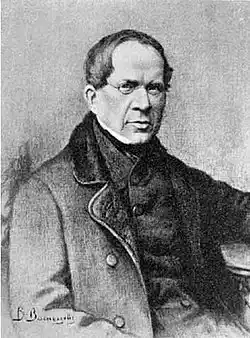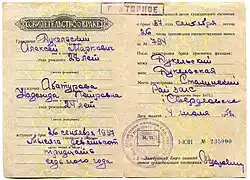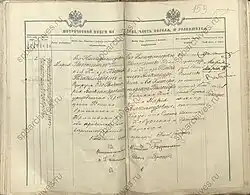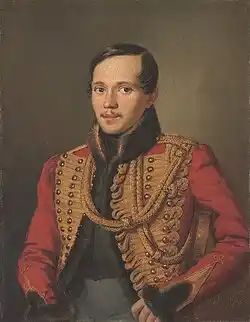
Surnames in Russia have always been more than just an addition to a name. They made it easy to determine the social status of a person, the occupation of his ancestors, and the territorial part of the state where the family and the bearer of the surname originated from. Prior to the October Revolution, a person's surname could even determine if they were born legitimately or not. After the revolution and the formation of the USSR, Russian citizens sometimes changed their surnames for security reasons (for example, noble surnames could be a pretext for repression, while Jewish surnames hindered education and careers in certain fields and later became the cause of dismissals and legal persecution), or for ideological reasons (new Soviet citizens preferred to get rid of old surnames, especially those indicating their church or non-proletarian origin). A new society was forming - the "Soviet people." Many immigrants from the eastern republics changed their surnames to the most common Russian ones in order to assimilate into the general population. The total number of Russian surnames exceeds 15,000.[1]
The surname Ivanov is the most widely used surname in modern Russia, followed by Kuznetsov, Smirnov, Popov, and Petrov, which are also among the top five most popular. Nearly one-third of the surnames in Russia nowadays are of non-Russian origin, including those of Arabian, Turkic, Ukrainian, Armenian, Jewish, Chinese, and Korean descent.[2]
History of Russian SurnamesHistory of Russian Surnames
See also: Russian Jewish surnames

For a long time, there were no official surnames in Russia. People used to go by their first names, patronymics, and nicknames. It wasn't until the 13th century that the first written records of surnames appeared, but they were only present in Novgorod. Russian surnames originally came from patronymics, which were based on the Christian name of a male ancestor. Surnames were also formed from the names of places, occupations, and popular nicknames.
Surnames became mandatory in the 16th century for privileged classes such as princes, boyars, nobles, and merchants. Wealthy landowners from prominent areas were the first to add their land's name to their surnames (e.g., Vyazemsky, Tverskoy), and the most influential and wealthy merchants, mostly from northern Russia, added their occupational specialties to their surnames (e.g., Rybnikov - fish seller). Double-barreled surnames combining a princely name with a nickname also appeared (e.g., Lobanov-Rostovsky).
For Jews (who formally had autonomy), surnames were introduced in accordance with the "Regulation on Jews" in 1804.
Russian surnames were mostly single or hyphenated (formed from the name of the principality with a nickname) and were passed down strictly through the male line.
Derivation of Russian surnamesDerivation of Russian surnames

According to a study on Russian surnames by Karaulova et al., "similar to other Slavic naming traditions, a Russian surname can be composed of almost any word by adding one of several specific suffixes. As a result, surnames in Russia are continuously being created: for example, both 'Lenin' and 'Stalin' are made-up surnames, which were initially used as aliases." [3] Most Russian surnames are derived from patronymics or nicknames and grammatically formed as possessive adjectives.[4] As a result, there are numerous surnames like Mikhailov, Svetlov, and Peskov, indicating that the person is a descendant of someone named Mikhail, or their ancestors had a nickname ‘svet’ (light) or ‘pesok’ (sand) accordingly. More Russian surname patronymic suffixes: --yv, -ev, -in, - iy, -oy.
To distinguish a female surname, an -a or -aya ending is added, making it clear whether you are dealing with a man or a woman: Mikhailova, Svetlova, Nikolskaya, Peskova, Kuchinskaya.
In the past, it was customary for married women to take their husband's surname, but this has not been a legal requirement in Russia since 1918. Nowadays, many women choose to keep their original surname, especially when they get married later in life, to avoid the hassle of changing their name.
Types of Russian surnamesTypes of Russian surnames

Russian surnames are a rich linguistic tradition rooted in patronymics, professions, descriptive traits, places, and sometimes noble lineages. They evolved from medieval naming customs and were systematized by the time of the Russian Empire. Importantly, Russian surnames reflect gender—male and female versions differ, typically with -ov/-ova, -in/-ina, or -sky/-skaya endings.
Russian surnames of patronymic originRussian surnames of patronymic origin
These surnames are derived from first names of ancestors, typically male. They are among the most common in Russia.
- Ivanov / Ivanova – from Ivan (John)
- Petrov / Petrova – from Pyotr (Peter)
- Sidorov / Sidorova – from Sidor (Isidore)
- Vasiliev / Vasilieva – from Vasiliy (Basil)
- Nikitin / Nikitina – from Nikita (Nicholas)
- Fedorov / Fedorova – from Fyodor (Theodore)
- Alexandrov / Alexandrova – from Alexander
- Yakovlev / Yakovleva – from Yakov (Jacob)
- Mikhailov / Mikhailova – from Mikhail (Michael)
- Andreev / Andreeva – from Andrei
- Sergeyev / Sergeeyeva - from Sergei (Sergius)
- Pavlov / Ivanova - from Pavel (Paul)
Russian surnames of occupational originRussian surnames of occupational origin
These names refer to professions or crafts practiced by ancestors.
- Kuznetsov / Kuznetsova – “blacksmith” (kuznets)
- Plotnikov / Plotnikova– “carpenter” (plotnik)
- Melnikov / Melnikova – “miller” (melnik)
- Rybakov / Rybakova – “fisherman” (rybak)
- Pekarev / Pekaereva – “baker” (pekar)
- Goncharov / Goncharova – “potter” (gonchar)
- Slesarev / Slesareva – “metalworker/locksmith” (slesar’)
- Ponomarev / Ponomareva – “sexton” (church assistant)
- Pastukhov / Pastukhova – “herder” (pastukh)
- Shaposhnikov / Shaposhnikova – “hatter” (shaposhnik)
- Koval - "koval" (blacksmith)
- Bondarchuk "cooper" (bondar)
Russian surnames of toponymic originRussian surnames of toponymic origin
Some Russian surnames are derived from geographical names (cities, villages, rivers, lakes, etc.) from where one of the surname holder's ancestors came; usually, they end in -sky/-skaya:
- Smolensky / Smolensakya - "from Smolensk"
- Moskovsky / Moskovskaya – “from Moscow”
- Novgorodtsev / Novgorodtseva - "from Novgorod"
- Arkhangelsky / Arkhangelskaya– “from Arkhangelsk”
- Saratovsky / Saratovskaya – “from Saratov”
- Kazanov / Kazanova – “from Kazan”
- Tverskoy / Tverskaya – “from Tver”
- Oryolov / Oryolova – “from Orel”
- Perminov / Perminova – “from Perm”
- Altaysky / Altayskaya – “from the Altai region”
- Irkutsky / Irkutskaya – “from Irkutsk”
- Sibiryakov / Sibiryakova – “from Siberia”
- Onegov / Onegova – “from the lake Oneg”
Russian surnames of aristocratic or noble originRussian surnames of aristocratic or noble origin
The Middle Ages saw the rise of the Russian nobility, or dvoryanstvo (Russian: двoрянство). After more than 70 years of communism, it is difficult to estimate how many descendants of noble families are still in Russia today, although it is believed that between 50 and 60,000 Russians descend from noble families. While many members of the middle and lower-ranking families stayed in Russia after the Revolution, the majority of the descendants of the princely and comital houses have moved to western nations. Some of these surnames of aristocratic origin are:
- Tolstoy / Tolstaya – famous noble family (e.g., Leo Tolstoy)
- Romanov / Romanova – Russia’s imperial dynasty
- Yusupov / Yusupova – one of the wealthiest aristocratic families
- Sheremetev / Sheremeteva – noble Muscovite family
- Obolensky / Obolenskaya – princely Rurikid lineage
- Gagarin / Gagarina – ancient Rurikid dynasty
- Vorontsov / Vorontsova – important noble family of imperial court
- Bagration / Bagrationi – Russian noble house of Georgian origin, which ruled Georgia from the Middle Ages until the early 19th century; the family has three branches: Bagration-Gruzinsky, Bagration-Moukhransky and Bagration-Imeretinsky
- Trubetskoy / Trubetskaya – princely family of Lithuanian-Ruthenian origin
- Karamzin / Karamzina – noble family of Tatar origin, linked to historians
Russian surnames of descriptive originRussian surnames of descriptive origin
As in most surname traditions, there are Russian surnames that reflect physical features, behaviors, or personality -some of them with negative connotations, in order to keep away evil spirits:
- Nekrasov / Nekrasova (from ‘ne krasiv’ -- not pretty)
- Durov / Durova (from ‘durak’ -- stupid)
- Chertanov / Chertanova (from ‘chert’ -- devil)
- Belyaev / Belyaeva – “white” or fair-skinned
- Chernov / Chernova – “black” (hair or complexion)
- Ryzhov / Ryzhova – “red-haired”
- Dobrynin / Dobrynina – “kind” (dobry)
- Lazarev / Lazareva – possibly “lazy” or slow-moving
- Zlobin / Zlobina – from zloba = malice (may have ironic origins)
- Ugryumov / Ugryumova – “gloomy”
- Smirnov / Smirnova – “quiet, peaceful” (one of Russia's most common)
- Skorobogatov / Skorobogatova – “soon-rich” (possibly humorous)
Russian surnames of derived from old pagan Slavic originRussian surnames of derived from old pagan Slavic origin
Russian surnames of derived from names of animalsRussian surnames of derived from names of animals
Russian surnames of derived from Orthodox clergy originRussian surnames of derived from Orthodox clergy origin
Russian surnames of foreign originRussian surnames of foreign origin

Russian aristocracy originally had foreign roots and thus bore foreign surnames, many of them derived from Greek and Polish-Lithuanian origin. In the 17th century they were joined by the Fonvizin (German von Wiesen) and Lermontov (Scottish Lermont).
There are also foreign language bases in surnames given to illegitimate children of noble families:
- Sherov (French cher, "expensive")
- Amantov (French amant, "beloved")
- Oksov (German Ochs, "bull")
- Gertsen (German Herz, "heart").
The surnames of descendants of Tatar immigrants were reminiscent of the names of these immigrants:
- The Yusupovs (descendants of the murza Yusup)
- The Akhmatovs (from the Khan Akhmat)
- The Karamzins (Tatar kara, meaning "black", and murza meaning "lord, prince")
- The Kudinovs (distorted from the Kazan-Tatar kuday meaning "God, Allah").
Not always does a Turkic origin of a surname indicate non-Russian origin of its bearers; in some cases, they come from nicknames that were in fashion in Muscovite Russia.
Most common Russian surnamesMost common Russian surnames
Celebrities with Russian surnamesCelebrities with Russian surnames
- Alla Pugacheva, Russian singer
- Kirill Serebrennikov , Russian film director and screenwriter
- Alexander Pushkin, Russian poet
- Mikhail Lermontov, Russian poet
- Anatoly Karpov , Russian politician and journalist
See alsoSee also
- Patronymic
- Russian genealogy
- Russian ethnicity
- Russian emigration
- Russian Jewish genealogy
- Slavic surnames
- Ukrainian surnames
- Russian Jewish surnames
- Belarusian surnames
- Bulgarian surnames
- Silesian surnames
- Czech surnames
- Serbian surnames
- Tatar surnames
- Rusyn surnames
- Polish surnames
- Slovene surnames
- Croatian surnames
- Bashkir surnames
- Eastern European surnames
- Armenian surnames
- Russian American surnames
Explore more about Russian surnamesExplore more about Russian surnames
- Last names on MyHeritage
- Russia - Record collection catalog on MyHeritage
- Surnames in Modern Russia at Taylor & Francis online
- Most Common Russian Surnames at Forebears
- Full List of Russian Surnames (rus) at Gufo.me
- Russian Last Names and Meanings at Family Education
- How Do Russian Names Work? A Detailed Guide at International Center for Language Studies
References
- ↑ Balanovskaya, E., Solovyova, D., & Balanovsky, O. (2005). ‘Familial portraits’ of five Russian regions. Medical Genetics, 1, 2–10.
- ↑ https://www.tandfonline.com/doi/full/10.1080/03014460.2019.1685130?needAccess=true
- ↑ https://asistdl.onlinelibrary.wiley.com/doi/full/10.1002/asi.24104
- ↑ B. O. Unbegaun, Russian Surnames. Oxford: Clarendon Press, 1972.
- ↑ https://semfamily.ru/wp-content/uploads/2020/11/Zhyravlev.pdf


